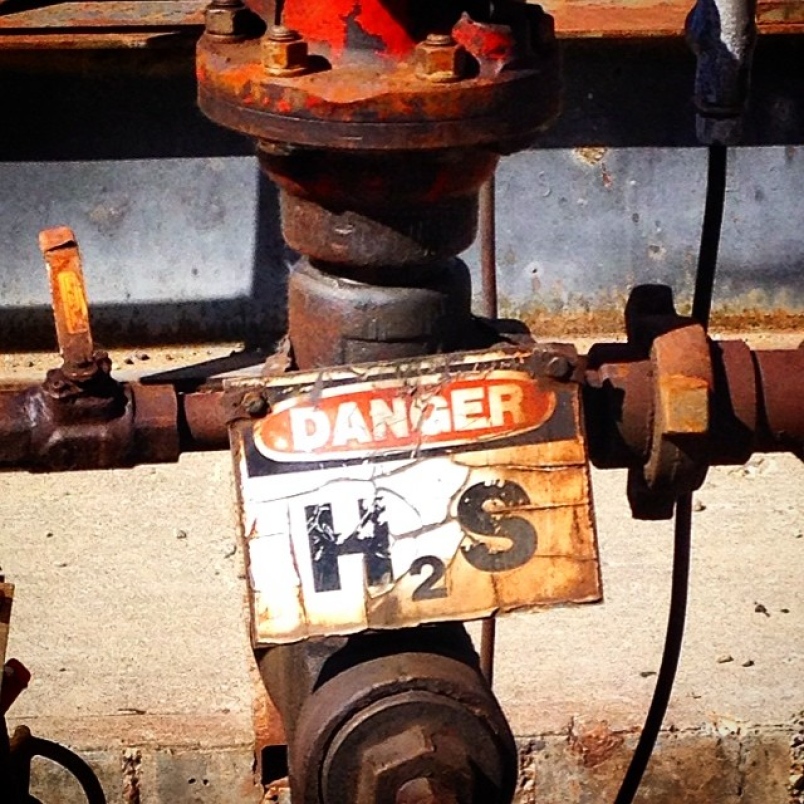 The oil & gas industry relies on standards for safety and efficiency: The oil & gas industry relies on standards for safety and efficiency:
o NACE
o American Petroleum Institute (API)
o Standards Norway / NORSOK
NACE
NACE is an international association of engineers whose sole focus is on corrosion. They put forth technical standards for industries such as oil & gas. These standards are meant to ensure that materials, processes, and technologies are consistent and meet defined requirements for specific corrosive environments. NACE MR0175 / ISO 15156
This set of standards applies to the oil & gas industry – specifically exploration and production operations in petroleum, petrochemical, and natural gas. NACE MR0175 / ISO 15156 offers a set of principles and recommendations for the selection of corrosion resistant metals to prevent H2S stress corrosion cracking in sour gas environments. Sour gas (H2S) is not just a poisonous substance but can cause catastrophic corrosion – stress corrosion cracking (SCC) in particular. NACE MR0175 / ISO 15156 pertains to oil & gas production and natural-gas sweetening plants in H2S-containing environments. These standards are not typically applicable to refining or downstream processes and equipment. These specifications provide:
o General principles for selection of cracking-resistant materials
o Standards/recommendations on crack-resistant carbon low-alloy steels, and cast irons
o Standards/recommendations for crack-resistant corrosion resistant alloys NACE MR0103
For petroleum refining companies that are faced with hydrogen sulfide corrosion, NACE established a different standard – MR0103. NACE MR0103 provides material requirements for preventing stress corrosion cracking (SCC) to equipment in sour petroleum refining and related processing environments. These material standards apply to H2S as a gas or dissolved aqueous phase. American Petroleum Institute (API) Standards
API 6ACRA / API 6A718
API stands for the American Petroleum Institute. They are a trade organization that focuses on best practices for safety in the natural gas and oil industries. One of the ways they accomplish this goal is through material standards. Standard API 6ACRA focuses on standards for age hardened nickel alloys including:
o Inconel 718
o Inconel 725
o Incoloy 925
o Alloys 716, 935 and 945
The standard focuses on the use of these alloys in oil & gas pressure-containing and pressure-controlling components as defined in standard API 6A. It provides guidance on each alloy’s process control and testing requirements in order to ensure that they are not embrittled and meet the minimum material requirements. Note standard API 6A718 was superseded by API 6ACRA. API 20F
In addition, Special Fasteners China. also offers bolting per the American Petroleum Institute standard API 20F. API 20F provides qualification, production and documentation specifications for corrosion resistant bolting used in the petroleum and natural gas industries. This specification covers the following product forms, processes, and sizes:
a) machined studs;
b) machined bolts, screws and nuts;
c) cold headed bolts, screws and nuts;
d) hot formed bolts and screws <1.5 in. (38.1 mm) nominal diameter;
e) hot formed bolts and screws ≥1.5 in. (38.1 mm) nominal diameter;
f) roll threaded studs, bolts, and screws <1.5 in. (38.1 mm) diameter;
g) roll threaded studs, bolts, and screws ≥1.5 in. (38.1 mm) diameter;
h) hot formed nuts <1.5 in. (38.1 mm) nominal diameter;
i) hot formed nuts ≥1.5 in. (38.1 mm) nominal diameter Standards Norway
Standards Norway is an organization that is responsible for all Norwegian standardization except those pertaining to the electrotechnology and telecommunication industries. NORSOK is the name of the set of standards they develop for the oil & gas industry. The goal of NORSOK is to provide the petroleum industry recommendations for safety and cost effectiveness. NORSOK M650
The purpose of NORSOK M650 is to ensure the manufacturers can sufficiently produce items with acceptable properties in the following material grades:
o Duplex SS: all grades, product forms and dimension
o High alloyed austenitic SS: all grades, product forms and dimensions
o Nickel base alloys: castings
o Titanium and its alloys: castings
NORSOK M650 requires a mill to document all the details of their manufacturing routes in order to verify that the mill has sufficient competence and experience with these material grades. NORSOK M630
This is a set of material data sheets that provide detailed requirements (such as chemistry, mechanical properties, etc.) that a material must meet to be qualified. Though these data sheets were created for piping systems, they can all be applied to other components such as pressure vessels, pumps, and strainers. |